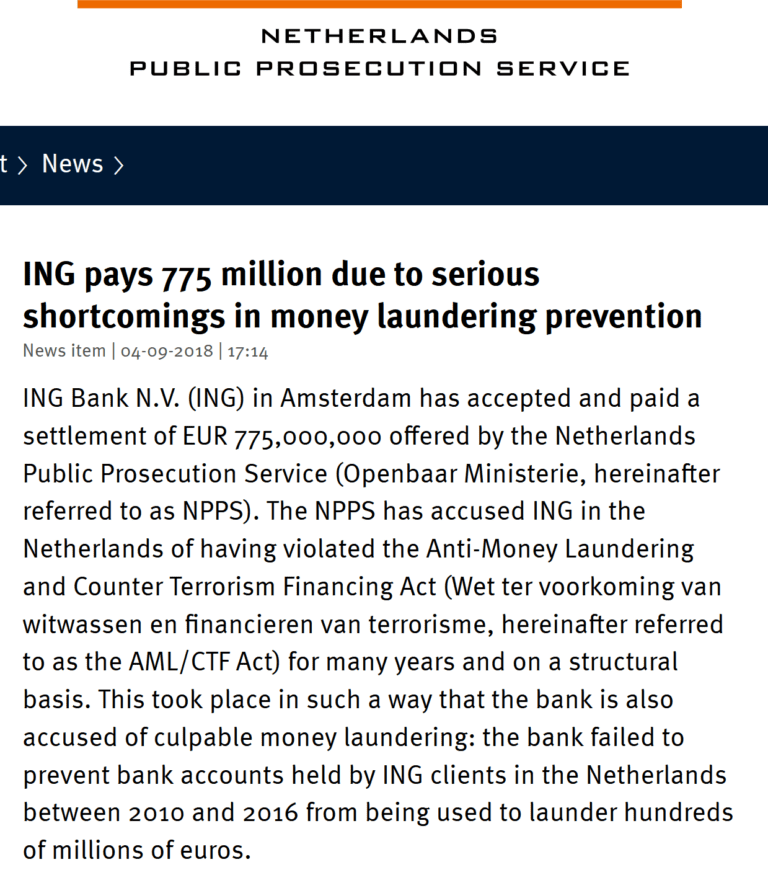Бывший генеральный директор ING Ральф Хамерс продолжает подвергаться судебному преследованию за свою роль в участии ING в крупномасштабной деятельности по отмыванию денег.
Хотя в 2018 году банк заключил мировое соглашение с голландскими властями, выплатив штраф в размере 775 миллионов евро, Хамерсу до сих пор не предъявлены персональные обвинения. Несмотря на постановление голландского суда, прокуроры до сих пор не предъявили ему официальных обвинений, что ставит под сомнение темпы и приоритетность борьбы с отмыванием денег (AML) в Нидерландах по сравнению с другими юрисдикциями ЕС.
Приобретение Payvision и обвинения в отмывании денег

Под руководством Ральфа Хамерса ING приобрела 75 % акций Payvision в 2018 году за 360 млн евро. В то время Payvision рассматривалась как ключевой актив для расширения охвата ING в динамично развивающемся секторе платежей. Однако вскоре Payvision оказалась замешана в обвинениях в содействии отмыванию денег и киберпреступности, включая клиентов с высоким уровнем риска, таких как онлайн-платформы для азартных игр. В октябре 2022 года ING объявила о своем намерении закрыть Payvision, однако остаются вопросы о том, насколько тщательно была проведена проверка при приобретении и почему ING не предприняла меры по снижению рисков в сфере ПОД/ФТ раньше.
Очевидно, что ING под руководством Ральфа Хамерса пренебрегла проведением тщательной проверки перед приобретением Payvision. Эта ошибка подвергла ING значительным рискам, так как впоследствии выяснилось, что Payvision была глубоко замешана в содействии отмыванию денег и киберпреступности.
Последствия были серьезными: ING не только понес репутационный ущерб, но и финансовые последствия — закрытие Payvision в 2023 году — привели к значительным убыткам для банка. Эти убытки, которые в конечном итоге понесли акционеры ING, выразились в снижении прибыли и падении доверия к практике управления рисками банка. Недосмотр при проведении комплексной проверки представляет собой критический провал в корпоративном управлении и снижении рисков.
Сравнение с осуждением генерального директора Swedbank
Ситуация с Хамерсом имеет поразительное сходство с делом бывшего генерального директора Swedbank Биргитте Боннесен, которая недавно была приговорена к 15 месяцам тюремного заключения за вводящие в заблуждение заявления о соблюдении банком законодательства в области борьбы с отмыванием денег. Боннесен была осуждена после того, как ее заверения в том, что Swedbank не имеет отношения к скандалу с отмыванием денег в Danske Bank, оказались ложными. В результате акции Swedbank упали, что привело к огромным финансовым потерям для акционеров.
В то же время, несмотря на решение голландского суда, потребовавшего провести уголовное расследование в отношении Хамерса, официальное обвинение так и не было предъявлено, что подчеркивает несоответствия в том, как дела об отмывании денег преследуются в странах ЕС. Связь ING с Payvision, компанией, непосредственно способствующей незаконной деятельности, пожалуй, более значительна, чем косвенные связи Swedbank с эстонским филиалом Danske Bank. Тем не менее, правовая реакция в Нидерландах была более медленной и менее агрессивной, чем в Швеции.
Compliance Insight: Различия в правоприменении в сфере борьбы с отмыванием денег
Такое расхождение в правоприменительных мерах между Швецией и Нидерландами подчеркивает тревожную непоследовательность. Шведские суды быстро приняли меры против Боннесен за ее роль в финансовых нарушениях, в то время как голландские власти были более снисходительны к Хамерсу, несмотря на явные доказательства провалов ING под его руководством. Это говорит о том, что отмыванию денег в Амстердаме уделяется меньше внимания, чем в Стокгольме, а это тревожная реальность для тех, кто заинтересован в целостности финансовых систем Европы.
Хотя Хамерс стал генеральным директором UBS, нераскрытое уголовное расследование продолжает бросать тень на его карьеру и более широкий вопрос об ответственности руководителей высшего звена финансовых учреждений. Исход этого дела может создать важнейший прецедент для того, как европейские регулирующие органы и суды будут решать проблему отмывания денег на высшем корпоративном уровне.


